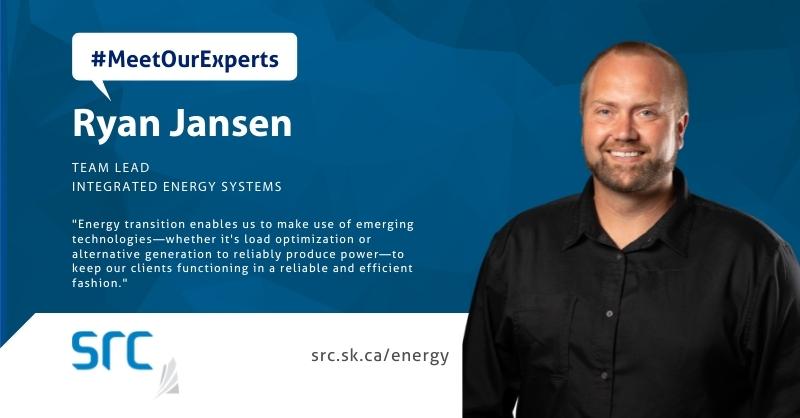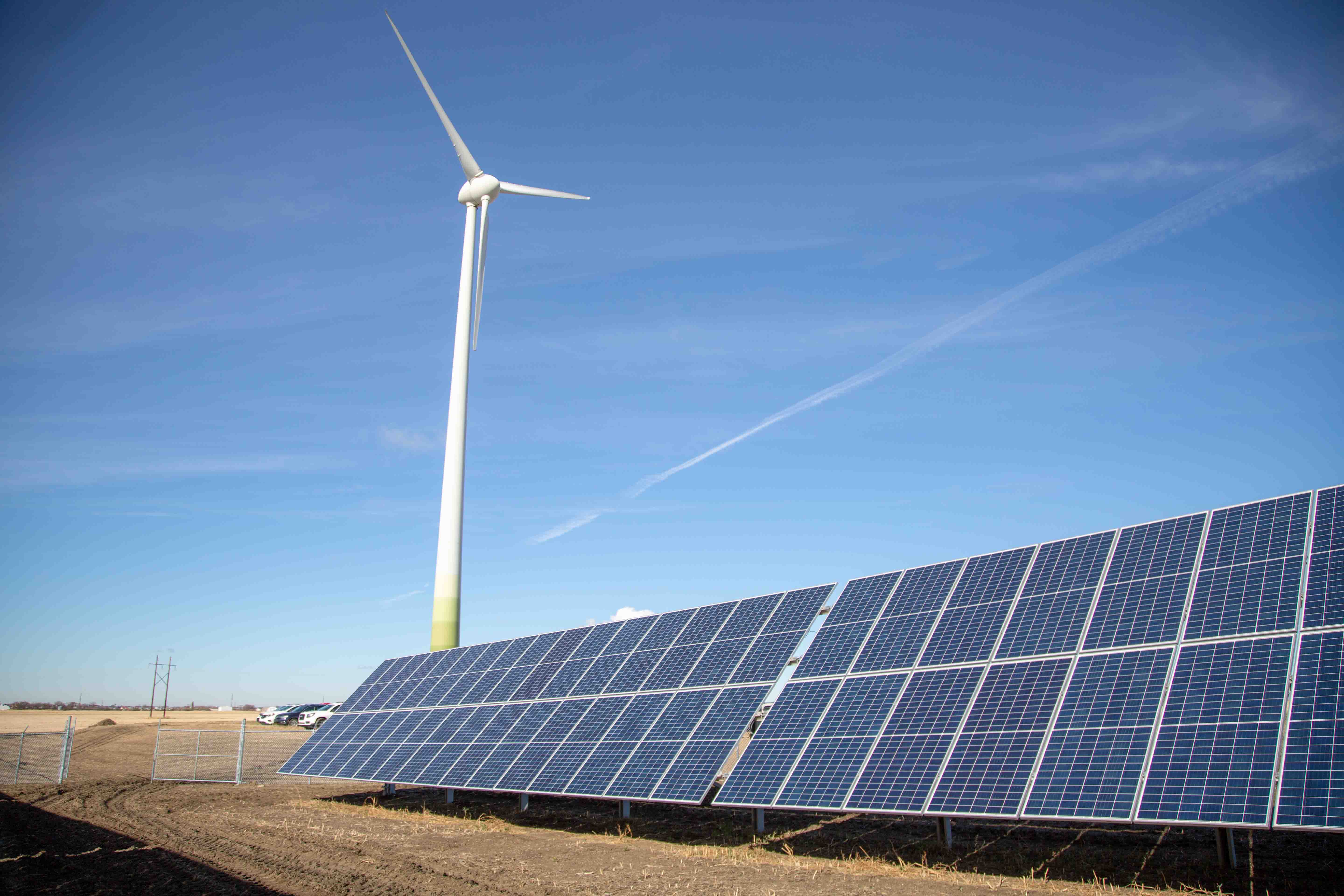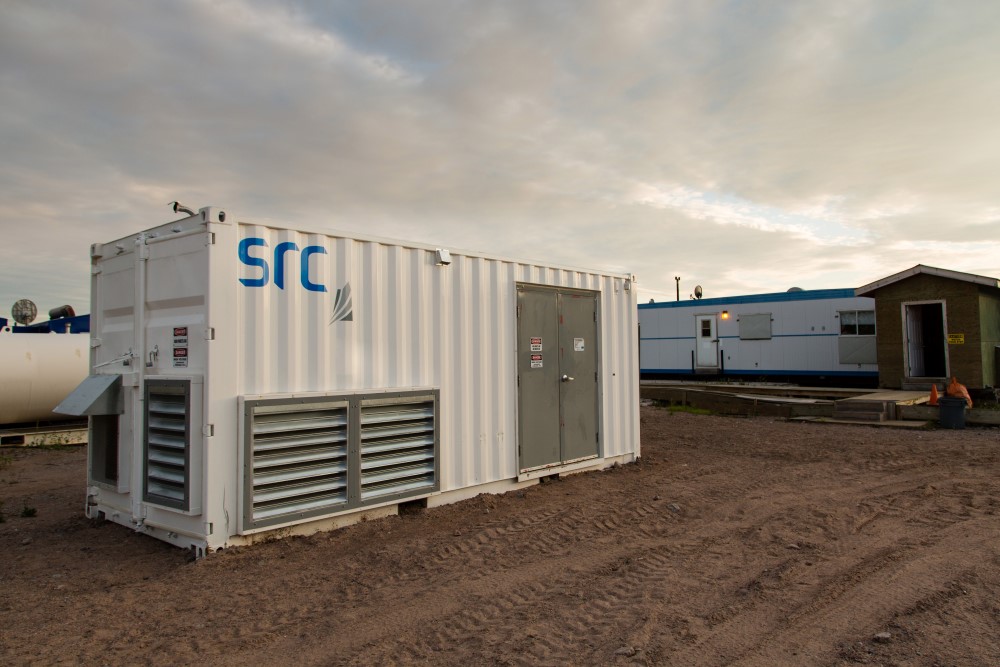
As industries examine how they can reduce emissions and their carbon footprint, the idea of net-zero energy is gaining traction.
SRC has a long history of working in energy efficiency and renewables, and that work continues today. “Going back to the 1980s and 1990s, SRC was involved in natural gas—on the farm and with vehicles—and that transitioned into hydrogen,” says Ryan Jansen, Team Lead, Integrated Energy Systems.
“As technology has emerged, we're working with energy storage, renewable generation and smart grids.” Today, that is where Jansen—an electrical engineer with a Master of Science—is focused. SRC has stayed on the cutting edge of renewable energy and Jansen on the forefront of the work.
“Working at SRC, we get to implement emerging technologies to help our clients. We look at new, developmental systems—things that are coming to market,” says Jansen, “and find opportunities to mitigate risks, implement the technology, make necessary adjustments and prove out its operation so that not only our clients, but the industry as a whole can adopt these technologies at a faster rate so we can get the benefits at the beginning.”
Renewables, Grids and More
SRC is focused on solar, wind and battery technology, as well as smart and microgrids—all with an eye on helping industry improve efficiencies and get to net zero—because transition is important to its clients and to the industry.
“Every client needs to operate efficiently and reliably. That means there is a strong tie to their financial performance and their viability as a company,” says Jansen. “That's what we focus on first. Energy transition enables us to make use of emerging technologies—whether it's load optimization or alternative generation to reliably produce power—to keep our clients functioning in a reliable and efficient fashion.”
Energy transition will also typically incorporate renewable generation and lower carbon emitting generation sources, meaning the transition is tied to both financial and environmental performance.
“We’re seeing companies take two approaches to net-zero energy transition these days. One option is declaring the intention and then examining how to get there,” says Jansen. “The other is the opposite. They examine how to get there before making the declaration to achieve net zero.”
Either option can work for companies. It is a matter of deciding which works for an organization.
Whether you declare first or examine first, a thorough look at operations is required to get a current state on energy usage, emissions and more. “An assessment of a company’s whole operation can set the baseline. Net zero means more than just energy usage at a site. It also includes air travel, miles driven and more. It’s the whole energy picture.”
Once that data is compiled and assessed, then a company can start making decisions on where to make changes to reduce energy usage, use energy more efficiently and shift energy sources where possible.

Change for the Better
“Once you have determined your baseline and can see where work is needed, it’s time to go after the quick wins,” says Jansen. Reducing usage or using energy more efficiently is often where changes can be made first to have impact on the goal of net zero.
It’s here where processes can be altered or eliminated to reduce consumption, or where more efficient technologies can be integrated.
The Big Stuff – Energy Sources and Generation
After the energy load reductions and efficiencies are addressed, attention should turn to energy sources and generation. This is the most complex hurdle on the road to net zero, with many established and cutting-edge technologies offering industries opportunities for change.
“Reliability is the core matter in this space,” says Jansen. “Operations need a reliable energy source all the time. While renewable energy sources can provide low-cost generation to help reduce emissions and carbon footprint, there are still issues that need to be tackled.”
Solar and wind energy are well-established technologies, but storage is required to ensure that energy is available constantly—or a backup system for generation is needed, which is often fuelled by diesel. Geothermal energy, heat pumps and biomass are excellent options to consider, and the supply of both heat and electricity using very small modular nuclear reactors are possibilities.
While still emerging, microgrids and smart grids can also be excellent options to achieve net-zero energy goals.
“Renewables have reduced in cost over the last 10 to 15 years,” says Jansen. “Storage is at the precipice where it's starting to come down in price. The emerging lower cost of batteries and new battery technologies, combined with renewables that are cost competitive with conventional generation, will create resilient, reliable systems that can use the low-cost generation to supply energy for the entire industry,” says Jansen.
The most important issue for industry to overcome in the coming years is maintaining consistent operations while still cutting carbon. A reliable, resilient operation from emerging technologies—whether it’s load shedding and deferral combined with alternative generation and storage—while reducing overall carbon footprint is the goal.

Let’s Do This
“There is no straight line to net-zero energy,” says Jansen. “Pre-assessment, a deep understanding of your operation, assessing costs and benefits, and setting goals are vital for success. Just the process of getting started will raise more questions.”
Baseline assessment is a good start and SRC’s energy experts can help your company determine what steps you need to take to achieve net zero. Net zero energy is possible with the right mix of data analysis, decisions, technology and expertise to guide the way.
“There are hurdles to overcome. The emerging energy transition is not a one size fits all. You have to approach the problem holistically,” says Jansen.
This is where SRC comes in.
“We have a diverse range of talents and abilities, right from core research through to implementation, operation and support. When we approach problems such as energy efficiency, renewable generation, storage and reliability, we look at the big picture,” says Jansen. “SRC can help in the energy transition because of our expertise, our experience and our approach.”
Learn more about SRC's Energy services.
This blog post was written by former SRC employee Brook Thalgott.
